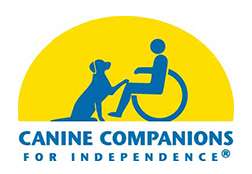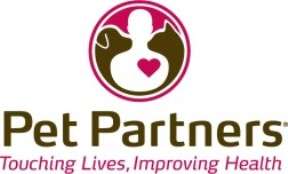Therapeutic Facility Dog
The most advanced technology capable of transforming the lives of students sometimes has a cold nose and a warm heart.
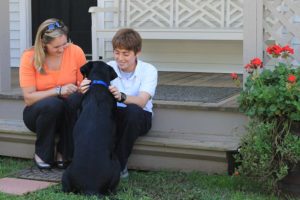 In 2010, Keswick School welcomed the first canine staff member to campus. Barter served the school from 2010 to 2017. In 2017, CCI matched another dog to TKS named Kalia. Kalia served at TKS from 2017-2020. In 2019, CCI matched the school with our third dog, Nitro. Like Barter and Kalia, Nitro is a facility assistance dog that was able to join the school community after spending six to nine months training with professional instructors at one of five regional training centers with Canine Companions for Independence (CCI). Kalia knows over 40 specialized commands and was selected for our school.
In 2010, Keswick School welcomed the first canine staff member to campus. Barter served the school from 2010 to 2017. In 2017, CCI matched another dog to TKS named Kalia. Kalia served at TKS from 2017-2020. In 2019, CCI matched the school with our third dog, Nitro. Like Barter and Kalia, Nitro is a facility assistance dog that was able to join the school community after spending six to nine months training with professional instructors at one of five regional training centers with Canine Companions for Independence (CCI). Kalia knows over 40 specialized commands and was selected for our school.
CCI enhances the lives of people by providing highly trained assistance dogs and ongoing support to ensure quality partnerships. Facility assistance dogs are different from typical family pets in that CCI dogs are specifically trained to work with a wide variety of people.
Numerous studies have demonstrated benefits of therapy dogs for students like ours. At TKS we recognize the role a dog has in helping students build healthy attachments, increase verbal interactions, develop leisure/recreation skills, boost self-esteem, decrease anxiety, reduce loneliness, and improve attention skills. All of these components directly complement the objectives of our Social-Emotional Curriculum.
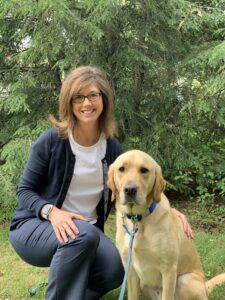 Today, Nitro is an asset to our program and benefits the students in countless ways. Students are able to assist him with daily routines of grooming, exercising and training. Examples of trained commands “VISIT” and “LAP” can allow for positive and calming interactions between the student and the dog. They can also accompany a student in their therapy session, group speech, relaxation classes in OT, transitions, morning routines and attend Community Meeting.
Today, Nitro is an asset to our program and benefits the students in countless ways. Students are able to assist him with daily routines of grooming, exercising and training. Examples of trained commands “VISIT” and “LAP” can allow for positive and calming interactions between the student and the dog. They can also accompany a student in their therapy session, group speech, relaxation classes in OT, transitions, morning routines and attend Community Meeting.
Through careful training a CCI facility dog is comfortable working in a variety of environments and with students who may move or interact differently when he is present. At the same time students will naturally verbalize and participate with more enthusiasm in classroom and residential activities. For those that need a social bridge to improve interactions with peer and adults, such support can be provided by shared attention given to Kalia. As CCI describes, assistant dogs are “Goodwill ambassadors, and often, best friends as well. They open up new opportunities and new possibilities and spread incredible joy.”
In 2016, another dog joined the TKS campus named River. River is a graduate of the Pet Partners Therapy Program. Pet Partners Therapy Animal Program was established in 1990. From the Pet Partners website, they have rigorous standards for both animals and their human handlers to ensure safe and effective therapy animal visits in the community. Pet Partners requires successful completion of a comprehensive education program for all volunteers before the animal is assessed for suitability.
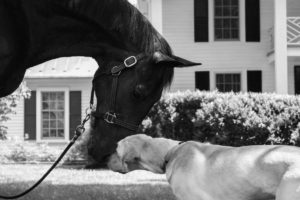 Focusing on safety elements such as infection control, patient confidentiality and best practices in handling, our therapy animal handlers bring a substantive level of professionalism to the settings they visit. Additionally, Pet Partners focuses on the importance of animal welfare, emphasizing that we are engaging our animals to participate in these activities and we must constantly be their advocate, ensuring they are both safe and content during interactions.
Focusing on safety elements such as infection control, patient confidentiality and best practices in handling, our therapy animal handlers bring a substantive level of professionalism to the settings they visit. Additionally, Pet Partners focuses on the importance of animal welfare, emphasizing that we are engaging our animals to participate in these activities and we must constantly be their advocate, ensuring they are both safe and content during interactions.
The Pet Partners Therapy Animal Program also distinguishes itself by requiring all animals to pass a skills and aptitude evaluation every two years to remain registered as a therapy animal, a practice recommended by both the International Association of Human-Animal Interaction Organizations (IAHAIO) as well as the Society for Healthcare Epidemiology of America (SHEA). However, it’s more than an evaluation for the animal. Handlers are also expected to demonstrate best practices in handling, elevating the requirements of a therapy animal team beyond basic obedience skills. We believe so strongly in the importance of professionally trained and capable handlers that all volunteers with the Pet Partners Therapy Animal Program have access to free continuing education.
